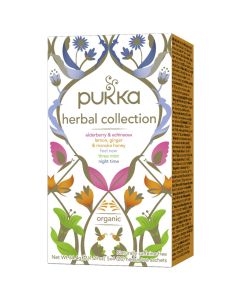
How To Identify & Remedy Different Coughs
By Girish Desai Pharmacist (GPhC 2019217)
Coughs can be caused by various conditions and situations. Often coughs are a side effect of cold and flu, alongside a sore throat and tiredness, and tickly coughs can be caused by dust, smog and pollution, or even cold air and hayfever.
A 'new, continuous cough' has also been noted as a main symptom of COVID-19, leading many to wonder about the difference between a coronavirus cough and a regular, tickly cough.
To help you better understand and deal with your cough, below we explain how to determine what type of cough you have, whether it’s a COVID-19 cough, the common causes of both dry and wet coughs and what remedies there are for coughs in general.
Coronavirus Coughs
There are three main symptoms of COVID-19 according to the NHS:
- A high temperature
- A new, continuous cough
- A loss or change of taste and/or smell
What Is A Continuous Cough?
A continuous cough is defined as coughing for more than 1 hour, or having 3 or more coughing episodes within 24 hours.
If you have a new, continuous cough, whether or not you have any of the other COVID-19 symptoms, the NHS advises that you get a coronavirus test, called a PCR test.
Causes Of Coughs
There are lots of causes of coughs, from smoking and allergies to colds and infections like bronchitis. Assuming you are not dealing with a cough due to COVID-19, we want to look at what causes dry coughs and tickly coughs. Understanding the causes of certain coughs will make it easier to identify the best remedies that will work for you.
Allergies, Hayfever & Coughs
Allergies, whether from pets or plants, can have many symptoms, including: sneezing, headaches and coughs. Depending on the cause, you will need to look at specific remedies, such as hayfever tablets or allergy medication. However, if you want help dealing with the cough in the short term, the tips below for coughs can help – assuming you are also treating the root cause.
Difference Between Dry, Tickly & Wet, Chesty Coughs
First, it's worth being aware that a dry cough and a tickly cough are basically the same. Dry coughs will often have a tickly feeling in the throat, though not always. The main difference in coughs is between dry and wet coughs.
A cough is the result of your throat reacting to an irritation or foreign substance and trying to eject it. A dry or tickly cough is one that doesn't produce any mucus; unlike a cold where you get a runny nose and your throat can feel thick with moisture – this kind of cough is called a productive or wet cough.
With a tickly cough, the absence of mucus leads to a dryness that becomes an irritation which tickles the back of your throat and makes you cough. To get rid of a tickly cough, you need to soothe the irritation.
A wet cough is caused by a buildup of mucus in the lungs that protects your body from infection. A buildup of mucus will lead to coughing as the body tries to get rid of the extra mucus. Because the mucus buildup is around the lungs, a wet cough is sometimes called a chesty cough, and often chesty cough remedies are the ones tailored to dealing with both the mucus and the cough itself.
How To Deal With A Dry, Tickly Cough
Remedies For A Tickly Cough

A tickly cough can be frustrating as it interrupts your day-to-day, even if it isn’t a symptom of something else. However, there are a number of home remedies and tips you can use to deal with it.
We recommend trying one or some of the following:
Drink tea
Specifically caffeine-free tea using honey, ginger and/or thyme. Honey soothes your throat, ginger promotes healing and thyme relaxes your respiratory tract.
Eat Hot Soup
Whether brothy or blended, you are aiming here to add moisture and soothe your throat with a delicious hot soup.
Drink More Water
You might simply need to drink more water to alleviate a tickly cough, especially if it is the result of dust getting in your mouth.
Suck On Throat Lozenges/Hard Candies
Focus on those with high-quality glycerin, like Grether's Pastilles, as this helps keep your mouth and throat moist and prevents irritation.
How To Deal With Wet, Chesty Coughs
The remedies for chesty, wet coughs are actually quite similar to dry coughs, since hydration is key to clearing your system and removing the excess mucus that causes chesty coughs.
- Drinking tea – caffeine-free tea, such a chamomile, mint or honey and ginger are all flavourful ways to getting the hydration you need. Chamomile in particular can be good as it has naturally anti-inflammatory properties and can soothe soreness from a cough, particularly one caused by a cold.
- Drink more water – drinking water is important for shifting most ailments. Aim to drink room temperature or hot water rather than cold as cold water is harder to break down causing extra stress for your body when it’s already trying to deal with a cold or flu.
Tips For Dealing With Coughs

Beyond hydration, there are some ways to help ease your cough and tackle it head on. These tips work for both dry, tickly coughs and wet, chesty coughs:
- Avoid caffeine – you might not realise it but caffeine is dehydrating. It might feel good to drink coffee or caffeinated tea in the moment, but it could make your cough worse!
- Inhale steam – obviously be careful here, the aim is to steam your nose and mouth, not boil them. Put your face over a bowl of freshly boiled water, or take a bath and soak in the vapours.
- Use a humidifier – since dry, cold air can make a cough worse, or even be the cause, you can soothe your throat by adding more humidity to the air.
- Get plenty of rest – sleep will do wonders for you, your body and soul. If you are sick, whether with a tickly cough or not, you need to allow time to rest and heal. Get to bed early and enjoy a lie-in.
- Wrap a scarf around your throat – if you have to go outside, especially in cold weather, you should be wrapping up your throat, keeping it warm and locking moisture in.
If Your Cough Persists Then…
You should be able to shift a cough using the above, in a combination that works for you. The NHS suggests you should contact your GP if: 'you have had a cough for more than 3 weeks (persistent cough)', 'your cough is very bad or quickly gets worse' or you have other symptoms. See a GP urgently if you're coughing up blood.
Shop:
Disclaimer
The products offered are not intended to diagnose, treat, cure, or prevent any illness or disease, or to replace the advice of a medical professional. Results are not guaranteed and may vary from individual to individual.






